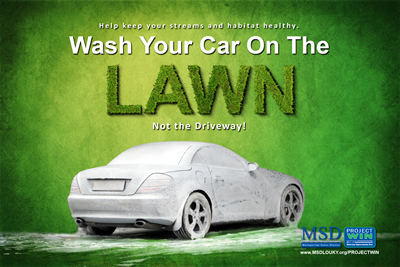Home & Garden
Home How You Can Help Home & Garden
Many of our everyday activities have an impact on the water quality in Louisville. Decisions that we make around our home and in our yards can make a difference in the chances that sewers will overflow, causing pollution to spill to waterways and on your property. Use of rain barrels, rain gardens, proper disposal of pet waste, and other household items can reduce pollution in rain water runoff and sewer overflows. More information on how to help improve water quality is described below:
Washing Machine/ Dishwasher
Water that is used in dishwashers and in the washing machine goes straight into the sewer. During periods of heavy rain, this extra water can overload the sewers and cause them to overflow. Wait to use your washing machine or dishwasher until after it stops raining. If possible, wait up to 24 hours after the rain has stopped.
Scoop the Poop

Pet waste that is left on the ground is carried to local waterways when it rains and can possibly contaminate our rivers and streams. Kids and pets play in these very same places. Pick up your pet’s waste and put it in a trash can. Do you part to help us keep our waterways clean!
Grass Clippings
Grass clippings get carried off by rainwater into streams. When grass and leaves break down it can increase nutrients, decrease oxygen and cause the death of aquatic organisms within our streams and rivers. Collect all grass clippings and leaf debris so that it does not enter into a stream or catch basin.
Paint, Prescriptions, Batteries, etc
Most household products are not safe to flush. Many things such as paint, batteries and prescription pills are flushed down the toilet and can cause major problems for the sewers and the quality of our water. Louisville Metro provides the community with a safe way to dispose of these products. Visit the Hazbin website here for details.
Used Motor Oil
Used motor oil that is put into the trash or emptied into a storm drain can contaminate our rivers and streams which could eventually harm our drinking water and water quality for wildlife. Just one gallon of used oil can contaminate 1 million gallons of water. Take used oil to a recycling center.
Pesticides/Herbicides
Whenever it rains, whatever is on our yards – including pollutants from chemicals in pesticides and herbicides – will drain to the creek or river by drainage facilities like ditches and storm sewers. In the combined sewer system, these pollutants can become part of an overflow to the creek or river. It is important to minimize the use of these chemicals, especially immediately before rainfall to prevent the pollution of the water bodies that humans and pets use for recreation.
Downspout Disconnection
In the combined sewer system area, downspouts from rooftops are sometimes connected directly to the sewer. When it rains, this water will drop in the gutter, go to the combined sewer, and will contribute to overflows. To help reduce these overflows, homeowners can disconnect these downspouts and direct to yards for irrigation, to rain gardens [link to manual], or to rain barrels. Every drop of water removed from the combined sewer helps, so please do your part to reduce overflows.
Rain Barrels
When downspouts are disconnected, rain barrels can be utilized to store storm water during a rain event. Water stored in rain barrels can be utilized during dryer periods as a water supply for plants and flowers.
Car Wash

Your vehicle will capture oil, grit, and dirt from the roadway surfaces where you drive. To minimize the risk of these pollutants getting to the creek or to the river please use car wash facilities when possible (these facilities have to treat the pollutants from vehicles prior to allowing the water to go to the sewer) or pull your vehicle into a vegetated area in your yard if you are washing at home. By washing your car in the yard, you reduce the amount of water carrying pollutants to the storm sewer system.
Rain Gardens
Rain Gardens make good use of rainwater runoff by infiltrating water re-directed from disconnected downspouts. Diverting storm water to rain gardens from our roofs, sidewalks, driveways and patios, helps improve the water quality of our local streams by keeping the runoff from reaching the street drains. Rain Gardens function as small retention basins enabling the water to percolate down into the soil, recharging groundwater and keeping rain water out of the street drain. Once established, native plants require minimal maintenance because they have adapted to the local soils and micro climate and their roots grow deep. They provide food and shelter for many interesting birds, butterflies and beneficial insects. Click here to download the rain garden manual.
Fats, Oils and Grease Fats, Oils and Grease
When put down the drain, fats, oils and grease wash into our sewer system and can cause major problems. Anything that is solid at room temperature will also be solid in the sewer. When FOG collects in sewer pipes, the pipe can clog and can lead to basement backups and sewer overflows. Project WIN has the following resources that outline best management practices for waste water and storm water discharges. Read more information on how to help water quality.
